Making Jobs for Former Prisoners
Larry Voigt stood in front of a crowd of social workers, nonprofit leaders, and members of the faith community on Friday afternoon, folded his arms, and declared, “No!” The president of Catholic Social Services of Washtenaw County was playfully addressing attendees of a jobs creation summit by illustrating the opposite of what they were there to do: Say yes.
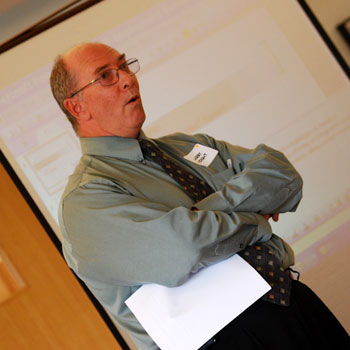
Larry Voigt, president of Catholic Social Services of Washtenaw County, demonstrates the classic arms-folded posture of saying no. The job creation summit held last Friday was partly about getting people to say yes. (Photo by the writer)
Say yes to what?
They were there to say yes to the idea of economic development through creation of self-sustaining businesses that would employ former prisoners making the transition to society. The jobs creation summit was sponsored by MPRI – the Michigan Prisoner ReEntry Initiative.
The first part of the program, which ran through the morning, lunch and the early afternoon, was dedicated to hearing from four panelists representing three organizations in other parts of the country that have successfully launched a variety of businesses that employ former prisoners and substance abusers.
Then, after hearing pitches for close to a dozen different business ideas, participants winnowed them down to three basic concepts for small group focus: a building weatherization business, a green cleaning enterprise, and an urban farming venture.
The working summit was meant simply to kick things off in a directed way, said Mary King, who’s the community coordinator for Michigan Prisoner ReEntry Initiative of Washtenaw County. The summit allowed some of the specific challenges to crystallize that are faced by business startups, especially those that say yes to the idea of employing former prisoners.
Models from Other Parts of the Country
Attendees of the jobs creation summit heard about three organizations with a successful track record of operating businesses that compete with other companies in the same market – moving companies, catering services, warehousing operations, and picture framing, among others.
TROSA
Ty Dexter, of Triangle Residential Options for Substance Abusers (TROSA) in Durham, N.C., led off the panel presentations, introducing himself as a 20-year abuser of crack cocaine while working in the finance industry. He’d come to TROSA in 2003, become a TROSA Scholar in 2005, and now works as the organizational development manager for the group.
Part of TROSA’s origin story includes the decision in 1994 by Durham County commissioners to lease the Old North Durham Elementary school to TROSA for $1 per year. As residents moved into the facility and began renovating it, they operated their first business, which had a contract to peel potatoes.
TROSA was founded by Kevin McDonald, whose background includes 12 years of experience at The Delancey Street Foundation, which was also represented on the panel.
Delancey Street Foundation
Introducing the history of The Delancey Street Foundation in San Francisco were Robert Davalos and James Dorne, two current residents of the organization’s residential facility. Each ticked off their resumé of incarceration with Davalos concluding: “I’m one of the guys you’re trying to help.”
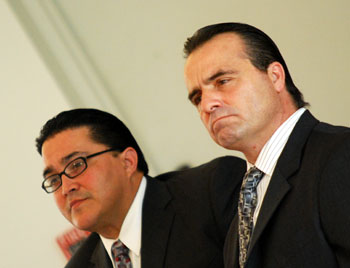
Robert Davalos and James Dorne, residents of the Delancy Street Foundation in San Francisco. (Photo by the writer)
The origin of Delancey Street’s first business as related by Dorne stood in contrast to the approach taken by Friday’s summit.
Dorne said that once the residents hit on the idea of starting a moving company, they made up flyers: “Moving? We’ll do it for less.” And they proceeded to put flyers everywhere they could think of. But, said Dorne, “apparently, you can’t put flyers any place you want!”
When the first call came in with an inquiry, they took down all the information for the job, and told the customer they’d call him back. They used that information to get an estimate from an existing moving company, then returned the call with a bid – lower than the estimate they’d received.
After getting that job, and starting to accumulate other work as a moving company, Delancey Street got a knock on the door from the authorities. They discovered, said Dorne, that the moving industry is regulated. So there were some fines to be paid. But in the course of that encounter with regulation, they learned how to become a legitimate moving company. Delancey Street now operates the largest independent moving company in northern California.
Asked about the contrast between this “easier to ask for forgiveness than for permission” approach in Delancey Street’s origin story and the very much “by the book” path woven throughout Friday’s summit, Mary King, community coordinator for MPRI in Washtenaw County, acknowledged the difference. But, she said, “we could never get away with that. People would say, ‘Catholic Social Services, you know better than that!’”
[Every "site" within the statewide MPRI has an administrative agency, and for Washtenaw County, that agency is Catholic Social Services of Washtenaw County.]
Pioneer Human Services
LoriAnn Larson, now a senior management associate with Pioneer Human Services in Seattle, introduced herself by recounting a professional trajectory that concluded with, “I was also a drug addict and an alcoholic. I was never incarcerated, but I should have been.”
Larson described how she now manages some of the same housing for Pioneer where she began her treatment for substance abuse working as a custodian. Among the businesses operated by Pioneer, she emphasized that the warehouse and distribution centers really required almost no skills – only a willingness to work. As one specific example of a distribution center project, she laid out how a component for Wii – the Zapper – had been discovered as defective, and needed to be individually unpacked for thousands of units to be tested. The several-step process of unpacking and testing was accomplished at a Pioneer warehouse and distribution center.
The Pitches
The proposals for actual businesses that might be started in Washtenaw County ranged from fairly vague concepts to going concerns that might be tweaked to integrate employment for ex-prisoners.
Amy Heath of Living Stones Community – a relatively new nonprofit that’s enjoyed its 501(c)3 designation for about a year – pitched the idea of a business based in urban agriculture. She cited the experience of Will Allen with Growing Power in Milwaukee who was awarded a 2008 MacArthur “genius grant.” Allen contends that per acre, an urban farm can generate $200,000 in revenue as contrasted with $20,000 for a conventional farm.
Following up by phone with Heath, she said that the gardening of LSC to date had consisted of individuals growing vegetables in plots at their homes and selling the produce at the Ypsilanti Farmer’s Market. The idea was to raise awareness of the nonprofit. The very long-range vision of a working farm in a rural setting where former prisoners could live and work had been replaced by the more feasible vision of working a smaller piece of land closer to an urban center and its transportation infrastructure. They’re looking at acquiring some land between Ann Arbor and Ypsilanti.
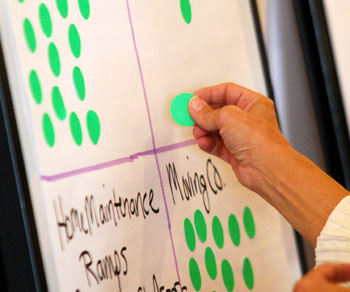
Participants indicated the business ideas they supported by placing green dots on poster paper. (Photo by the writer)
From its inception, the nonprofit has had a goal of creating a mechanism for former prisoners to re-enter society – an impetus provided by Heath’s own personal family experience with the Michigan Department of Corrections. The Living Stones Community is affiliated with the Free Methodist Church, in which Heath is an ordained elder.
In contrast to Living Stones Community, Neighborhood Senior Services was not conceived as a way to help former prisoners make the transition to society. Rather, its mission is focused on supporting seniors in ways that allow them to remain living in their own homes – for example, by building a wheelchair ramp to make a house accessible. But Barbara Penrod, president of NSS, was on hand Friday to pitch the idea of using the nonprofit as a platform from which to base prisoner re-entry support.
Rev. Kujenge Ashé described a nonprofit that was working on filing for its 501(c)3 status called Community Organizing for Abundant Life. He sketched out a COAL project that involves taking portraits of African American ministers in their churches and contributing the collection to the African American Museum in Detroit. Also in the mix was a computer repair/recycling business idea.
Faye Askew-King, program director with SOS Community Services, described a “healthy fast food” project, but allowed that SOS needed a business partner: “I’m a social worker, I don’t know anything about starting a business.”
Not all pitches included existing nonprofits or groups trying to form one. Mary Heinan, who drew on her 26 years of incarceration as inspiration for her business idea, described an environmentally-friendly cleaning business. It was conceived, she said, by reflecting on the blood-spill cleaning crews staffed by inmates. Inmates could volunteer for the crews, which required a couple days of training, and paid more than the average prison job. Another perk: inmates had the chance to go into other areas of the prison – wherever the biological material needed to be cleaned up.
Ora Wright, drawing on her experience being homeless, described a realty service focused on providing housing. Kathleen Russell pitched an idea based on Segways.
In all there were nearly a dozen different ideas that were floated. They were all written on giant poster-sized pieces of paper, and the segue into lunchtime was provided by “dot voting” on the ideas: participants placed their allocated green sticky dots next to the idea they were interested in working on.
Small Group Focus: Weatherization, Not Moving
The outcome of the dot voting narrowed the focus of the large group to four ideas: a building weatherization business, a green cleaning enterprise, an urban farming venture, and a moving business. Based on a show of hands, the moving business idea was dropped from further consideration in a smaller group.
That meant that University of Michigan business student Greg Boothroyd, who’d been interested in working on the moving company idea, needed to pick a different group. He wound up in the same place as The Chronicle for the smaller groups focused on one idea – the group focused on a weatherization business.
But why had Boothroyd been interested in the moving company idea? Following up by phone with him after the summit, he noted that all three of the panelists’ organizations had moving companies as a part of their business enterprise. And there was reason for that, he said. Part of it had to do with how simple and straightforward the business was, as well as the minimal amount of customer face-time required of workers.
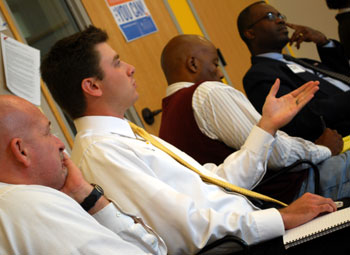
Greg Boothroyd, (yellow tie) during the small group focused on a weatherization business, asked: "Who are the customers who will pay for this service?" (Photo by the writer)
In his assessment of the business ideas, Boothroyd wasn’t just drawing on his background as a business student. He completed an internship through UM’s Institute for Social Research at the W. J. Maxey Boys Training School, and worked for two years at Washtenaw County’s juvenile detention facility.
The group that was focused on weatherization as a business concept included Joe Summers, who’s vicar at the Episcopal Church of the Incarnation and Trenda Rusher, director of the county’s Employment Training and Community Services (ETCS) department. Both Summers and Rusher are part of the steering team for Washtenaw County’s MPRI site.
Rusher’s presence at that particular group was related in part to the fact that through ETCS she’s administering $4 million in federal stimulus money specifically designated to weatherize houses.
If nothing else, during the smaller group work on a weatherization business, some of the baked-in obstacles to such a business as a prisoner re-entry vehicle were identified. For one thing, the idea of ex-prisoners working in people’s homes was something that would need to be addressed from a homeowner’s perspective. Rev. Ashé suggested that the faith community might play a role of reassuring homeowners that they and their possessions would be safe. Another participant said that the name “Neighborhood Senior Services” was trusted among her peers, and that would help build confidence for customers. Barbara Penrod of NSS participated in the weatherization focus group, because her idea had been combined with one on weatherization.
Two of the panelists, James Dorne and LoriAnn Larson, also participated in the weatherization group, and offered differing perspectives on the need for disclosure about the workers’ backgrounds. Larson said that it was crucial to make clear to customers who they were – they always identified themselves as Pioneer Human Services and their mission statement was on the back of their business cards. Dorne, though, emphasized that while Delancey Street was well known for what it was and that they used the Delancey Street name, they did not try to make an extra point of emphasis that customers would be doing business with ex-prisoners.
The idea that the business enterprises needed to adhere to the social enterprise model was something that Boothroyd nudged the group towards on a couple of occasions during the discussion. As presented by Larson during the panel presentations, the components of that model are: the discipline of business, an entrepreneurial strategy, the compassion of social service, strategic planning, and a hand up, not a handout. It was the first of these components that Boothroyd called the group’s attention to: the business needed to be self-sustaining. It needed to be able to compete with existing businesses in the same market.
The group had perhaps too easily glossed over the part of the discussion meant to focus on a market analysis and potential competition.
The Challenge of Transitional Housing
In a follow-up phone conversation with Mary King on Monday, she said that of the three ideas discussed in small groups, the urban agriculture idea had the most momentum. That said, she also had a conference call scheduled for later Monday afternoon about the weatherization idea.
It was striking that the social enterprise businesses presented by the panelists were supported by organizations in each case that provided their wraparound support in a residential setting. Otherwise put, the housing requirement for the workers in the enterprise was already met.
King allowed that this was a significant difference in the “scattered” housing approach that MPRI uses. The local MPRI housing program, in place for about a year, includes renting some two-bedroom units from the nonprofit Avalon Housing as well as from some private landlords. But they can only provide a subsidized rent for six months, King said.
The scattered housing approach, King explained, was driven partly by resistance in the community to larger concentrations of ex-prisoner residents. This was something that all three panelists had acknowledged as an obstacle that had to be overcome. Larson, of Pioneer Human Services, said that in one case, Pioneer had to withdraw a plan for a housing project due to community opposition. In that case, the community had said no.
The Chronicle will try to track whether the marketplace eventually says yes to any of the businesses discussed at Friday’s summit.




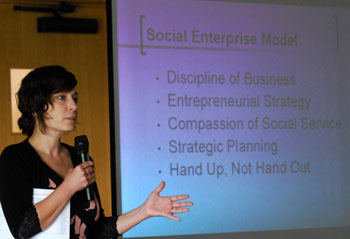
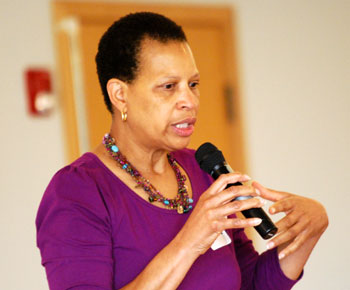
Great job on the story. Please write more stories on the success of the MPRI initiative.
Many news sources only write about non profits during the holiday season or when there is some controversary that rarely has anything to do with the mission. I really appreciate that you are writing about some of the innovative thinking happening in our community.
This was a very important event in the history of our community. Thank you so much for being there and writing such an excellent story. MPRI has many success stories to tell. Please share them with your readers.